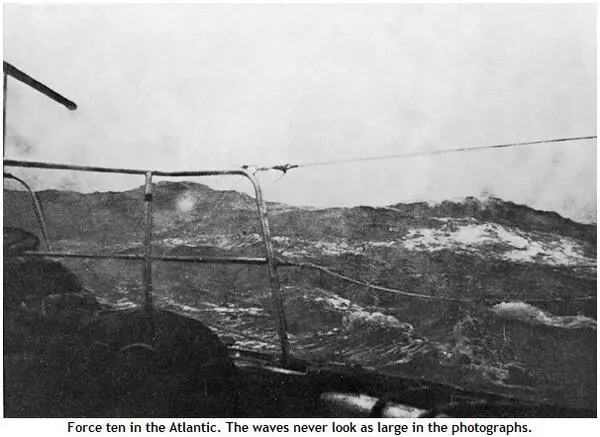Five minutes later a Dutch naval vessel, HMS Zuiderkruis, turned up and, after making radio contact, the operator’s first words were, “Can we assist you in clearing your spinnaker?” I said I could handle it, and after getting a position and a weather report and ascertaining that they had picked me up on radar at a distance of five miles, I went on deck, shamed into climbing the mast. I waved goodbye to the ship and started up. After ten minutes of swearing and struggling with the bloody thing, it finally came unwrapped, and as the big sail filled I was startled to hear a loud cheer. I swung around to look behind me and found the ship stopped, her entire crew hanging over the rail, applauding. She gave a loud hoot on her horn and was on her way again. So much for privacy in single-handed sailing.
In the middle of that night I got a fine scare. I was sleeping like a stone when there came a loud thumping on deck. Pirates? I charged up the companionway ladder to find nothing. Then, as I was about to chalk the sound up to a nightmare and go below, the thumping started again. A small, needle-nosed fish had jumped into the cockpit and was thrashing about the floor. I caught him and returned him to the sea. I don’t know if I really rescued him, for at that moment a pair of dolphins appeared and started into the phosphorescent torpedo act again, and he could have made a midnight snack for one of them. I watched, still fascinated, until they departed, then crawled back into my bunk.
I settled into a deep contentment. I was comfortable, well fed, and doing what I had been planning for months. The nearest problem was eight hundred or so miles away, and I was enjoying my solitude and self-sufficiency. The only fly in the soup was that Harp had never stopped taking water, and as time wore on she took more and more. There was so much that it was impossible to isolate and tell where it was coming from.
The electric bilge pump had packed up again and, since the intake for the main pump was too large to collect water in the shallow bilges unless the boat had three or four inches of water inside her, the only way to bail was with a sponge and a bucket, and it wasn’t much fun. By now I was taking out about twelve gallons of water four times a day, and anything that touched the floor got soaked immediately.
I continued north, and the barometer began to drop. When it went down six millibars in four hours I knew I was in for a blow, and I reefed before dark even though the wind had not yet risen; I had no wish to have to reef in the middle of the night with the deck lights not working. By morning we were in our first full gale ever. Fortunately, the wind was still behind us and we were able to maintain our course while running before it with a double-reefed main and the genoa reefed to storm jib size. We were making excellent time.
I settled into a heavy weather routine. This consisted mostly of staying in my bunk, sleeping or reading, apart from a periodic look around the horizon for shipping and a check of the sails and decks to make sure nothing was chafing or coming adrift. And bailing. As the weather deteriorated, the leaking got worse. I began to become accustomed to living in my seaboots, with two inches of water slopping about the cabin. There were two exterior forces as well which made things less comfortable. One was the mini-broaches. When a boat “broaches to” when running before the wind, she suddenly veers and tries to point into the wind, ending up beam-on to the seas and the wind. This can be very dangerous, and Harp never quite performed the maneuver. What she did do was begin to broach, then correct. Fred, like any self-steering gear, could not anticipate the action of a following wave the way a helmsman can. He could not correct the boat’s direction to allow for a wave which was about to change it. Rather, he would have to wait until he felt the yacht beginning to change direction, then correct. This resulted in a sort of “mini-broach,” in which the yacht would start to veer abeam to the wind, then resume her proper course. The effect on the occupant of the boat and the contents was much like that on the occupants of a car which, traveling at, say, forty miles an hour, suddenly and sharply swerves to avoid another car backing out of a driveway, then continues down the street. If I were standing, cooking, for instance, when the mini-broach occurred to port, I would be tossed across the cabin to land on (or under) the chart table. This is not as much fun as it sounds.
The gale moderated after half a day, but we were left with a large, old sea running. Still, we had about twenty-four hours of relative quiet, with winds of no more than about twenty-five knots, and this seemed something of a rest. The most tiring part was the constant bailing.
Then the barometer, after rising a bit, began to fall again. In the first gale it had bottomed at about 1,014 millibars. It was there again when I went to bed on the night after the gale. During the night I dreamed, first, that I was being tossed around in a rubber dinghy. I think this came from being bounced in my bunk between the foam-rubber cushions of the settee back on one side and the lee cloth on the other. Toward morning I began to dream that I was lying on a beach with the sea lapping against the sand a few inches away. When I woke there was, instead, about four inches of water lapping around the inside of the cabin. Thinking for a couple of minutes that the boat was sinking, I began bailing. There is a saying that there is no more effective bilge pump than a frightened man with a bucket. This, I can say from personal experience, is true. Finally, when I had scooped up as much water as possible with the bucket and had to resort once again to the sponge, I realized that the boat was not sinking, that she had merely begun to take more water. During the next three days she took more than three hundred gallons.
When I had recovered enough from my fright to look around me, I found that the barometer had plunged to 1,008 during the night and that there was forty knots of wind blowing outside. While bailing, I had hardly noticed the motion of the boat. Now I did. I could hardly fail to notice it because suddenly the boat committed one of her finest mini-broaches; I was lifted off my feet, flung across the cabin from the chart table, and deposited squarely on top of the cooker. By the time I had disentangled myself from the stainless-steel fiddles on top there was the distinct smell of gas in the cabin. I quickly got into the cockpit locker and turned off the gas supply at the bottle. From that time, when I wanted to cook, I had to go into the cockpit, turn on the bottle, then dash into the cabin and light the cooker before enough gas collected to cause an explosion. Once the flame was burning it seemed to consume any excess gas from leaks, but I used the cooker as little as possible from then on. What really cut back my use of the cooker was the fire.
I had gone through my cockpit/cabin drill, but the disposable cigarette lighter was damp and slow to light. When I finally got a spark and a flame the whole cooker, both burners and the grill, burst into massive flame. My reaction still astonishes me. There was a fire blanket near my right hand and a fire extinguisher at my left knee; either would have quickly extinguished the fire. But instead of using one of these, I simply blew. The fire went out like the last candle on a birthday cake. I was very, very careful with the cooker after that.

Now, with so much wind blowing, the sea around me became an even more fascinating place. It wasn’t very cold and rain was spasmodic, so I would sit in the watch seat in the companionway and watch the gale. Fortunately, the wind had risen slowly and without changing direction radically, so the seas, though large, were regular and from the same direction. Using the mast as a guide, I reckoned the waves were a bit over twenty feet in height, and I watched, transfixed, as Harp rose to meet each one. Just when it seemed that a giant sea would overtake us and fall on top of the boat, the yacht would rise to meet it, and the wave would pass harmlessly under us. As the wind rose even more there seemed to be waves breaking everywhere, but never one immediately behind us. When that happens, when a yacht is “pooped,” an incredible weight of water falls onto the boat, serious damage can be done and gear washed away. If the main hatch has been left open the cabin can fill with water and the boat founder.
Читать дальше













